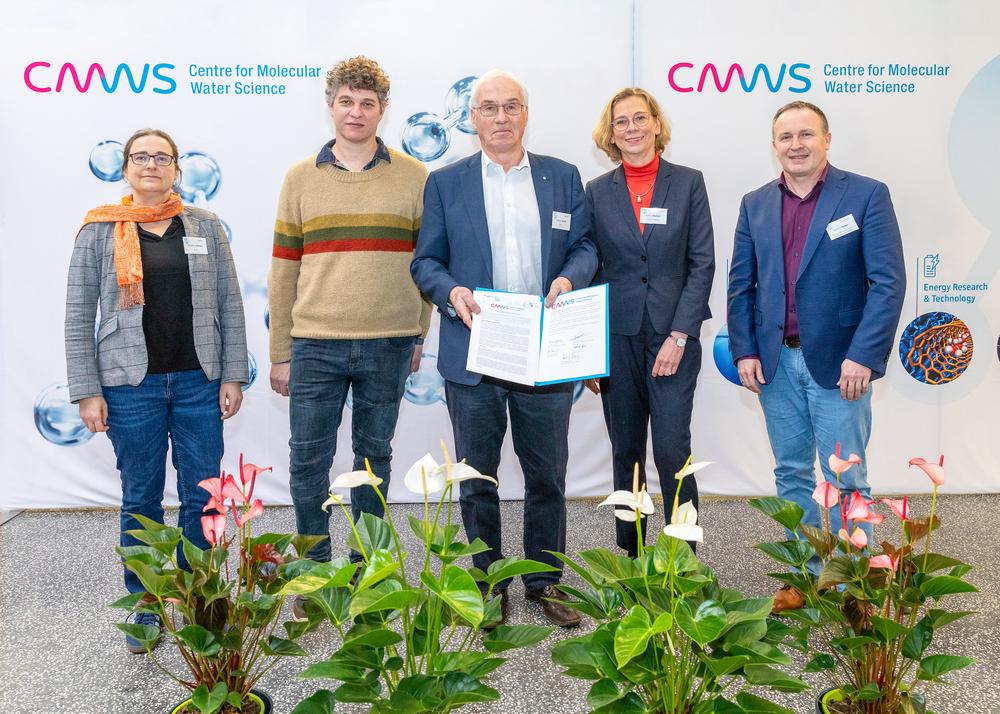Establishment of the Centre for Molecular Water Science (CMWS) Research Platform
47 Founding Members Sign the CMWS Declaration and Officially Establish the Consortium
As part of a festive event held on 26 February at the DESY campus in Hamburg, the consortium of the Centre for Molecular Water Science (CMWS), initiated by DESY, was officially established. The CMWS is a pan-European research network dedicated to molecular water science, transcending disciplines, fields, and methodologies. Forty-seven founding members from twelve countries – including fourteen German universities and eight Helmholtz Centres as well as industry partners – have signed the CMWS Declaration. As strategically important partners, they complement the pan-European excellence network in molecular water research and the unique analytical facilities available at the DESY campus in Hamburg-Bahrenfeld.

Water is essential for life on Earth. It influences climate, the environment, energy, and health. It is vital for technological applications and future developments – provided we understand and harness its unique molecular properties. Fundamental research at the CMWS lays the crucial groundwork for this as a globally unique platform, ensuring coordinated access to relevant research infrastructures and their advancement. DESY’s analytical research facilities – such as PETRA III, FLASH, and the European X-ray laser European XFEL – play a central role in this context. With DESY’s planned PETRA IV X-ray light source, it will also become possible in future to investigate the fundamental properties of water with unprecedented spatial and temporal resolution.
“At the CMWS, experts from a wide range of disciplines work closely together to explore the unique properties of water. This paves the way for insights that can significantly improve water-related technologies and thus contribute to environmental, energy, health, and climate protection goals,” says Britta Redlich, DESY Director for Photon Science. “The CMWS is a flagship application for PETRA IV, the ultimate 4D X-ray microscope for physical, chemical, and biological processes. Thanks to its outstanding coherence, PETRA IV will offer unique possibilities to investigate and understand water and its interactions at the molecular level.”
At its inaugural meeting on 26 February in Hamburg, the representatives of the 47 founding members elected the chair and deputy chair of the “CMWS General Assembly”: Britta Redlich, DESY Director for Photon Science, and Eric Breynaert, Senior Scientist and Manager of NMRCoRe, the NMR/X-ray platform for convergence research at KU Leuven in Belgium. The CMWS General Assembly also appointed the spokesperson duo for the CMWS consortium: Melanie Schnell, researcher at DESY and professor at Kiel University (CAU), and Patrick Huber, researcher at DESY and professor at Hamburg University of Technology (TUHH).
With the new centre, DESY is further expanding its role as an international research hub and underscoring the importance of interdisciplinary collaboration for the science of tomorrow. A central part of the CMWS’s scientific activities is to be based in a new research building on the Hamburg campus. The consortium is applying for funding from the Helmholtz Association’s strategic investment programme to support this.
Helmholtz President Otmar Wiestler congratulated the CMWS on its inauguration in a video message: “Water is the foundation of life and a key element in addressing some of the most pressing challenges of our time. The CMWS makes a valuable contribution to the Helmholtz mission: by providing interdisciplinary and long-term cutting-edge research to help tackle major challenges and drive transformation.”
“Water is life – and whether it’s about climate, the environment, energy, the economy or health – we need a deeper understanding of this substance for sustainable solutions to the big questions,” said Katharina Fegebank, Hamburg’s Senator for Science and Research. She said she was therefore delighted that the festive launch of the CMWS research network was sending a new foundation of knowledge for tomorrow’s sustainable technologies out into the world from the heart of Science City Hamburg Bahrenfeld. “Here, DESY, Universität Hamburg, and Hamburg University of Technology – with their joint Cluster of Excellence proposal ‘BlueMat: Water-Driven Materials’ – are joining forces with many international partners to strengthen the European network of excellence,” Fegebank said. “This is what the future looks like: from Hamburg, for Hamburg, and far beyond. I wish you a fruitful and inspiring start!”
